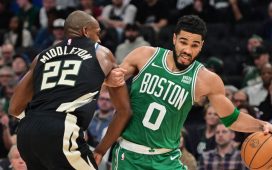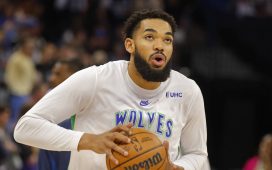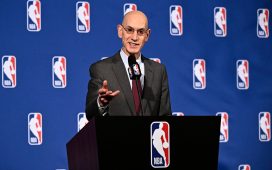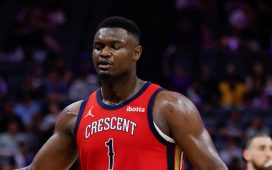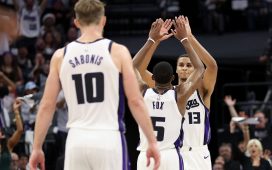When Jerami Grant entered free agency this offseason, he was one of the most sought-after players on the market. Grant was fresh off a bubble performance that saw him showcase defensive skills and timely shooting that put himself in position to attract several suitors. A 6-foot-8, 3-and-D wing with the ability to play a stretch-four as well.
When Grant signed a three-year, $60 million deal with the Detroit Pistons, the league was in shock. Though the Nuggets offered the same exact contract as Detroit, Grant took the Pistons deal, opting for a heightened role in the offense and yearning for a team that had people that looked like him in leadership positions. It was a shocking decision, considering Denver’s run as a title contender and recent Conference Finals run in the Bubble.
There were legitimate questions of whether Grant could take his game to the next level and transform into a franchise cornerstone. Also, would some of Detroit’s personnel decisions — like signing 100 centers and adding little shooting — put him in the best position to succeed?
Grant was certain to receive the reps to try and grow into the role, but he’s done even more than that. Grant has exceeded expectations, averaging 24.9 points, 6.1 rebounds and 2.5 assists in 13 games with the Pistons.
Grant’s growth from his days of the Process-era Philadelphia 76ers has been a revelation. A former second-round pick, Grant was a part of a group of young and unproven players on a tanking team. Grant was an intriguing prospect with a 7-foot-2 wingspan, but his outside shot was a weakness. He shot 35% from the field and 31% from the three-point line in his rookie season.
Grant continued to develop, becoming a key rotation player after he was traded to the Oklahoma City Thunder. Even as Grant became a starting caliber option for teams like the Thunder and Denver Nuggets last season, he was still a low-usage role player. He defended the super big wings like LeBron James and Kawhi Leonard on defense while standing in the corner and making the occasional cut on Denver’s pass-happy, egalitarian offense.
Grant’s ability to switch onto every offensive star from Donovan Mitchell to Anthony Davis made him a unique defender. However, with wings like Michael Porter Jr. and Will Barton present, and a clear cut pecking order with Nikola Jokic and Jamal Murray at the top, Grant was always going to be an afterthought in the offense.
In Detroit, Grant has accepted the challenge. He’s flashed improved ball handling skills and has shown some growth as a passer out of the pick-and-roll. Though his usage rate has skyrocketed early on, Grant’s been able to maintain efficiency. Despite launching about seven threes a night, Grant’s shooting 38.6 percent from beyond the arc.
A slow start to the season from veteran Blake Griffin has propelled Grant into an even larger role. No one expected Grant to ascend to these heights with Detroit. A former second round pick and in his seventh year, situations like this just don’t happen very often.
The general idea of Grant’s ascendance is a very familiar NBA story. The NBA role player that believes they are worthy of a larger role as a star of a team has happened before. A long line of role players on championship-contending teams that saw bigger roles for themselves. There might be none more notable than James Harden. Harden bet on himself in turning down a four-year, $50 million extension offer from the Oklahoma City Thunder.
Eventually traded to Houston, Harden proved himself as a superstar, an annual MVP candidate and a transcendent offensive wizard, all while making the All-Star team every year in eight full seasons with the Rockets. Jermaine O’Neal was stuck on the bench behind Brian Grant and Rasheed Wallace in Portland before a trade to the Indiana Pacers led to six consecutive All-Star appearances. Just recently, Malcolm Brogdon struck out on his own, leaving Giannis Antetokounmpo and the Milwaukee Bucks to run the show in Indiana.
It’s a sink or swim proposition. For all of the success stories, the opposite has occurred as well. When Trevor Ariza signed with the Houston Rockets in 2009 after winning a championship with the Los Angeles Lakers, he was thrust into a starring role on the perimeter for the Houston Rockets. Ariza was a disappointment, shooting 39.4 percent in his lone season for the Rockets before being shipped off to the New Orleans Hornets.
Klay Thompson and Manu Ginobili are a couple notable examples of players we can play the what-if game on how they would have looked as number one options instead of complementary stars to championship teams in Golden State and San Antonio, respectively.
Could Thompson — who never averaged more than 22.3 points — become a top-five scorer in the league if he wasn’t playing beside Stephen Curry and later Kevin Durant? Ginobili likely would have been able to make more than two All-Star teams if he was the lead ball handler on another team.
For Grant, he’s in a complete rebuild with the Pistons, which is far different from what he experienced in his lone season with Denver. Many players learn that the grass isn’t greener on the other side. But for Grant, he’s found out that moving to another team with a blue jersey and a circular design might be just as good.

